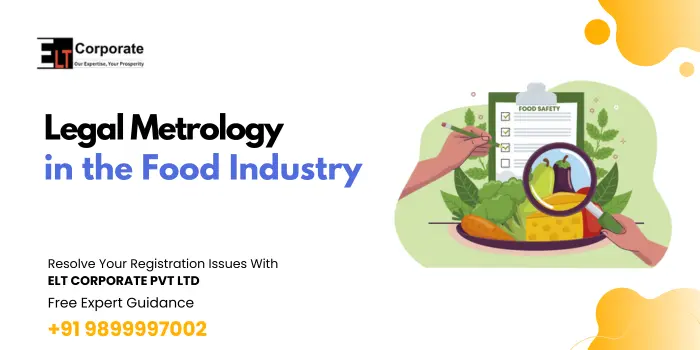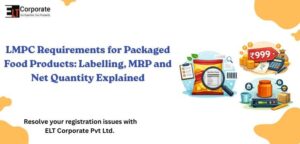Legal Metrology in the food industry plays a crucial role in maintaining fair trade practices, ensuring accurate measurements, and fostering consumer trust. In the food sector, every packaged product, whether it is flour, oil, spices, or ready-to-eat meals, must display correct weights, measures, and declarations under the Legal Metrology Act, 2009, and Packaged Commodities Rules, 2011
Accurate labeling and compliance ensure that:
- Consumers get what they pay for
- Businesses avoid legal penalties and build trust
- Market practices remain fair and transparent
When Legal Metrology in the food industry is ignored, it can lead to misleading packaging, fines, product recalls, or even market bans.
Why is Legal Metrology Important in the Food Industry?
- Protects Consumers
Ensures the quantity shown on the packet matches the actual content.
- Prevents Misleading Packaging
Stops sellers from showing fake weights, measures, or incorrect MRP.
- Maintains Fair Competition
All businesses follow the same measurement standards.
- Legal Compliance
Mandatory under Legal Metrology (Packaged Commodities) Rules, 2011.
Which Food Products Require Legal Metrology Compliance?
| S.No | Category | Examples |
|---|---|---|
| 1. | Grains & Pulses | Rice, wheat, lentils |
| 2. | Oils & Dairy Products | Edible oils, butter, milk powders |
| 3. | Beverages | Packaged juices, soft drinks, and bottled water |
| 4. | Processed & Packaged Foods | Chips, biscuits, chocolates, instant foods |
| 5. | Spices & Condiments | Salt, masalas, pickles |
| 6. | Frozen Foods | Ready-to-eat meals, ice creams |
What Are the Key Legal Metrology Requirements for the Food Industry?
The food industry must follow the rules below for all pre-packaged commodities:
| S.No. | Requirement | Details |
|---|---|---|
| 1. | LMPC Registration | Importers/Packers must register under Legal Metrology |
| 2. | Accurate Weight & Measure | Net weight/volume must match actual content |
| 3. | MRP Declaration | The Maximum Retail Price must be displayed clearly |
| 4. | Manufacturer & Packer Details | Name, address, and contact info required |
| 5. | Packaging Date & Expiry | Must show manufacturing, expiry, and batch details |
| 6. | Country of Origin | Mandatory for imported food products |
| 7. | Font Size & Visibility | Labels must be clear and readable |
What Are the Consequences of Non-Compliance in the Food Industry?
| S.No. | Violation | Penalty/Impact |
|---|---|---|
| 1. | Incorrect weight or measure | Fine up to ₹25,000 for the first offense |
| 2. | False labeling or missing declarations | Product seizure and repeated penalties |
| 3. | No LMPC Registration | Heavy fines and legal notices |
| 4. | Repeated violations | Possible imprisonment and business impact |
How Does Legal Metrology Ensure Fair Practices in the Food Industry?
- Regular inspection of weighing machines and packaging lines
- Random sampling to check product weight and label accuracy
- Verification and stamping of weighing instruments
- Mandatory LMPC Registration for importers and packers
- Strict penalties for violations to maintain market discipline
What Steps Should Food Businesses Take for Legal Metrology Compliance?
- Obtain LMPC Registration for all packaged goods.
- Verify Weighing Instruments with the Legal Metrology department.
- Ensure Accurate Labeling (weight, MRP, expiry date, manufacturer details).
- Keep Records Ready for inspections and audits.
- Train Staff to follow proper packaging and labeling standards.
How Can ELT Corporate Help with Legal Metrology in the Food Industry?
ELT Corporate is your trusted partner in Legal Metrology in the food industry. We provide end-to-end compliance support to help businesses avoid penalties and ensure smooth operations.
Our Services Include:
- Assistance in LMPC Registration for importers and packers
- Label Review and Compliance Check for packaged foods
- Verification & Calibration of weighing machines
- Documentation and Filing for inspections and renewals
- Query & Notice Handling from Legal Metrology authorities
- Training for Food Industry Staff to maintain compliance
Is Legal Metrology Mandatory for all Packaged Food Products?
Yes, every pre-packaged food item must follow Legal Metrology rules.
What is LMPC Registration in the Food Industry?
It is the Legal Metrology Packaged Commodity certificate needed for importers and packers.
What Happens if my Product Label is Incorrect?
You may face penalties, product seizure, or a market recall.








